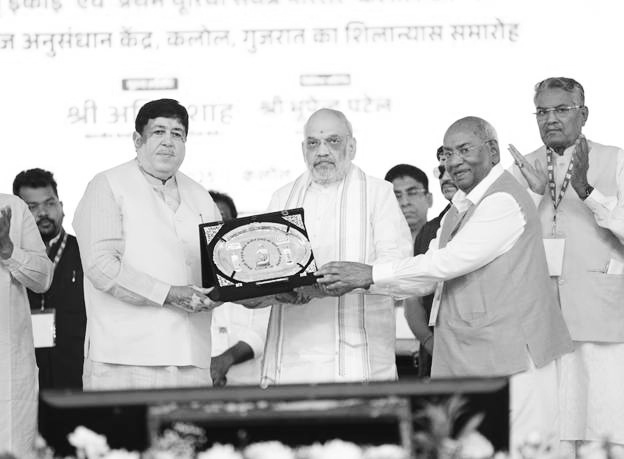Union Home Minister and Minister of Cooperation Amit Shah participated in the Golden Jubilee celebration of Indian Farmers Fertiliser Cooperative Limited (IFFCO) Kalol branch in Gandhinagar, Gujarat, where he also laid the foundation stone for the Beej Anusandhan Kendra. Among the dignitaries present was Gujarat Chief Minister Bhupendra Patel.
In his address, Shah highlighted that the occasion marks 50 years of IFFCO’s impressive journey, reflecting the fruitful combination of cooperative and corporate values. He praised IFFCO for effectively managing research and development, marketing, branding, and ensuring that fertilizers reach every household. He stressed that IFFCO has played a pivotal role in making India self-reliant in food grain production, connecting farmers with fertilizers and cooperatives.
Shah expressed optimism that in another fifty years, when IFFCO celebrates its centenary, its global reputation among cooperative organizations will be considerably enhanced. Additionally, he noted the extensive research and development carried out by IFFCO, citing its Kalol factory’s groundbreaking ceremony as a significant revolution in the sector. IFFCO has pioneered advancements in Nano Urea, Nano DAP, and Liquid fertilizers, thus contributing to increased agricultural productivity.
The minister emphasized that IFFCO has established India’s prominence in the global cooperative sector, particularly in Nano Urea and Nano DAP, which are now distributed worldwide. He reiterated that IFFCO has significantly increased its production capacity and continues to translate laboratory innovations into practical applications for farmers.
Furthermore, Shah announced the establishment of the Beej Anusandhan Kendra in Gandhinagar, linking it to Prime Minister Narendra Modi’s communication of various initiatives across all sectors. Under Modi’s leadership, the Ministry of Cooperation has launched 62 unprecedented initiatives, including the recently passed parliamentary bill for the Tribhuvan Sahkari University, named after Tribhuvan Das Patel, a notable figure in the cooperative movement.
Shah explained that this university aims to modernize cooperative education and enhance transparency across all levels of the sector, from primary agricultural credit societies (PACS) to apex bodies. It will leverage modern technologies such as artificial intelligence (AI) to analyze trends and guide the cooperative movement’s future direction over the next fifty years.
Through this event, Amit Shah underscored the importance of IFFCO in empowering farmers and advancing India’s agricultural landscape while reaffirming the government’s commitment to strengthening the cooperative sector in alignment with modern technologies and educational advancements.
Amit Shah inaugurated the Beej Anusandhan Kendra today, highlighting IFFCO’s impressive history of successfully completing all its initiatives. He noted that this new center aims to boost land productivity, enrich produce nutrition, reduce the reliance on water and fertilizers, and enhance seed quality, while also preserving ancient seeds that are thousands of years old.
Reflecting on IFFCO’s 50-year journey, Shah remarked that its growth has surpassed all expectations, suggesting that the newly established center will further contribute to the prosperity of farmers. The Union Minister of Cooperation emphasized the importance of strengthening cooperative institutions by focusing on primary societies and dairies. He mentioned that the government has been proactive in updating systems, linking primary agricultural credit societies (PACS) with new activities, and incorporating the entire economic cycle of dairies into cooperative structures, all under Prime Minister Modi’s guidance.
Shah detailed that IFFCO operates production units in five locations across three states—Kandla, Kalol, Phulpur, Amla, and Paradip—signifying a substantial self-reliance in the fertilizer sector. Currently, IFFCO’s fertilizer production capacity stands at 9 million metric tons, with sales reaching 11 million metric tons, contributing to a turnover of ₹40,000 crore and profits of ₹3,200 crore.
Over the past five decades, IFFCO’s evolution from traditional chemical fertilizers to nano and bio fertilizers has been remarkable. He pointed out that the early focus on bulk fertilizer application has transitioned to a more precise, controlled approach that maintains soil health while ensuring effective nutrient delivery. This shift has made fertilizers less expensive and more efficient, a significant achievement for farmers.
He also stated that with the introduction of Nano Urea and Nano DAP Liquid, there is no longer a need for additional fertilizer applications. IFFCO’s increased production capacity has enabled its products to be exported globally. Shah articulated that IFFCO’s dedication over the past 50 years has been primarily towards enhancing agriculture, grain production, and the rural economy in the interest of farmer welfare. Looking ahead, he emphasized that the next 50 years will be pivotal in modernizing agriculture to ensure high productivity, safeguarding agricultural land, and prioritizing environmental conservation.

